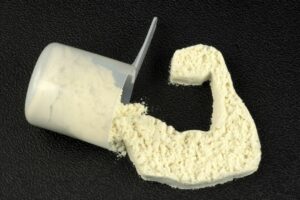Macronutrients and Micronutrients
Macronutrients and micronutrients are essential components of a healthy diet. They play different roles in the human body and are necessary for proper growth, development, and overall well-being.
Macronutrients are nutrients that are needed in substantial amounts. They include carbohydrates, proteins, and fats. Carbohydrates provide energy for the body, proteins are used for growth and repair, and fats help with the absorption of certain vitamins and minerals.
Micronutrients, on the other hand, are needed in smaller amounts. They include vitamins and minerals, such as vitamin C, iron, and calcium. These nutrients play a variety of roles in the body, including maintaining strong bones, healthy skin, and a strong immune system.
Training for Competition Preparation When training hard for competition preparation, it is important to pay special attention to your nutrient intake. Proper nutrition can help improve athletic performance, aid in recovery, and prevent injury.
Here are some key points to keep in mind
- Consume enough carbohydrates to fuel your workouts and competitions.
- Consume enough protein to aid in muscle recovery and growth.
- Consume healthy fats to support overall health and aid in the absorption of certain vitamins and minerals.
- Make sure to consume a variety of fruits and vegetables to ensure adequate intake of micronutrients.
- Consider taking a multivitamin or mineral supplement, especially if you have trouble meeting your nutrient needs through food alone.
Summary
Macronutrients and micronutrients are essential components of a healthy diet. They are necessary for proper growth, development, and overall well-being. Macronutrients include carbohydrates, proteins, and fats. Micronutrients include vitamins and minerals. When training hard for competition preparation, it is important to pay special attention to your nutrient intake. Proper nutrition can help improve athletic performance, aid in recovery, and prevent injury. Consume enough carbohydrates to fuel your workouts and competitions, enough protein to aid in muscle recovery and growth, healthy fats to support overall health and a variety of fruits and vegetables to ensure adequate intake of micronutrients. Consider taking a multivitamin or mineral supplement if you have trouble meeting your nutrient needs through food alone.

Does this affect male and female differently?
Both men and women need a balance of macronutrients and micronutrients in their diet to maintain overall health and well-being. However, there are some differences in nutrient needs between men and women.
Men generally have a higher caloric requirement due to their higher muscle mass. They also require more protein to support muscle growth and repair. Additionally, Women have a higher risk of iron deficiency due to blood loss during menstruation.
Women, on the other hand, have a higher requirement for certain micronutrients, such as iron and calcium, to support menstrual health and bone health. They also have a higher risk of developing osteoporosis later in life. Additionally, women who are pregnant or breastfeeding have increased nutrient needs to support the growth and development of the fetus or baby.
It’s essential for both men and women to be mindful of their nutrient intake when training for competition preparation and consult a healthcare professional or a registered dietitian to develop a nutrition plan that suits their specific needs.
In summary, both men and women need a balance of macronutrients and micronutrients, but they have some differences in nutrient needs. Men generally have a higher caloric requirement and more protein, while women have a higher requirement for certain micronutrients, such as iron and calcium, to support menstrual health and bone health. Pregnant and breastfeeding women also have increased nutrient needs.
How will this affect you if you are in a calorie deficits?
Being in a calorie deficit, meaning consuming fewer calories than your body needs, can have an impact on your nutrient intake and athletic performance.
When in a calorie deficit, it can be challenging to consume enough of the macronutrients and micronutrients your body needs. This is particularly true for athletes or individuals who are training hard for competition preparation, as their nutrient needs are higher.
For example, if you are consuming too few calories, it can be challenging to consume enough carbohydrates to fuel your workouts and competitions, enough protein to aid in muscle recovery and growth, and healthy fats to support overall health. Additionally, a calorie deficit can make it harder to consume enough fruits and vegetables to ensure adequate intake of micronutrients.
Being in a calorie deficit can also lead to muscle loss, fatigue, and a weakened immune system. These issues can negatively impact athletic performance and increase the risk of injury.
It’s essential to be mindful of your nutrient intake when in a calorie deficit, and to consult a healthcare professional or registered dietitian to develop a nutrition plan that supports your athletic goals while also ensuring that you are consuming enough of the macronutrients and micronutrients your body needs.
In summary, being in a calorie deficit can make it challenging to consume enough macronutrients and micronutrients, particularly for athletes or individuals who are training hard for competition preparation. This can negatively impact athletic performance and increase the risk of injury. It’s essential to be mindful of your nutrient intake and consult a healthcare professional or registered dietitian to develop a nutrition plan that supports your athletic goals while also ensuring that you are consuming enough of the macronutrients and micronutrients your body needs.
Best supplements to take? To support macro nutrients and micronutrients.
There are several supplements that can be taken to support macro and micronutrient intake. However, it’s essential to note that supplements should not replace a healthy diet and should always be taken in consultation with a healthcare professional or registered dietitian.
For macro nutrients, some popular supplements include:
- Protein powder: Can be a convenient way to increase protein intake, particularly for those who have trouble meeting their protein needs through food alone.
- Carbohydrate supplements: Can be used to increase carbohydrate intake before, during, or after exercise to improve athletic performance.
For micronutrients, some popular supplements include:
- Multivitamin/mineral: A daily multivitamin and mineral supplement can help ensure adequate intake of essential vitamins and minerals.
- Iron: Can be taken to support healthy blood and to prevent iron-deficiency anemia, particularly for menstruating women and athletes.
- Calcium: Can be taken to support bone health, particularly for women and older adults.
- Omega-3 fatty acids: Can be taken to support overall health and aid in the absorption of certain vitamins and minerals.
It’s worth noting that some supplements can have side effects or interact with other medications so. it’s essential to consult a healthcare professional or registered dietitian before starting any supplement regimen. Also, some supplements may not be suitable for everyone, for example, pregnant women and people with certain medical conditions.
In summary, there are several supplements that can be taken to support macro and micronutrient intake. However, it’s essential to consult a healthcare professional or registered dietitian before starting any supplement regimen. As some supplements can have side effects or interact with other medications. Some popular macro nutrient supplements include protein powder and carbohydrate supplements, while popular micronutrient supplements include multivitamin/mineral, iron, calcium, and omega-3 fatty acids.
Summary.
Macronutrients and micronutrients are essential components of a healthy diet. They play different roles in the human body, including providing energy, aiding in growth and repair, and maintaining strong bones, healthy skin, and a strong immune system. Training hard for competition preparation requires paying special attention to nutrient intake as it can improve athletic performance, aid in recovery, and prevent injury.
However, being in a calorie deficit can make it challenging to consume enough macronutrients and micronutrients, particularly for athletes or individuals who are training hard for competition preparation.
This can negatively impact athletic performance and increase the risk of injury. It’s essential to be mindful of nutrient intake, consult a healthcare professional or registered dietitian to develop a nutrition plan. That supports athletic goals while also ensuring adequate intake of macronutrients and micronutrients. Additionally, men and women have some differences in nutrient needs, men generally have a higher caloric requirement and more protein. While women have a higher requirement for certain micronutrients. Such as iron and calcium, to support menstrual health and bone health. Pregnant and breastfeeding women also have increased nutrient needs.





